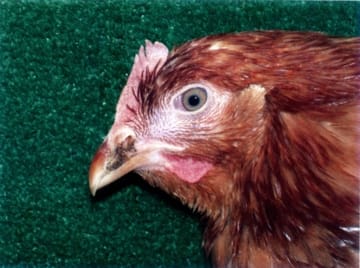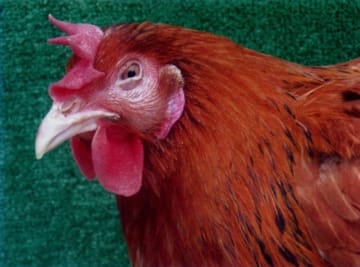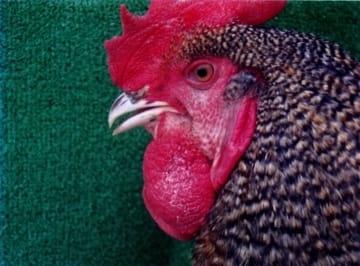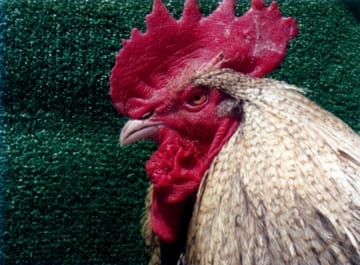It occurs mostly in chickens and is caused by Avibacterium paragallinarum. In general, the first sign is rhinitis with seromucinous discharges, often dries around the nasal orifices (Image 1).
Image 1 Seromucinous discharges are dried around the nasal orifices
Facial oedema in the infraorbital sinus area (Image 2). Usually, the state is accompanied by reduced food and water consumption, and in laying birds - with variable reduction in egg production.
Image 2 Facial oedema in the infraorbital sinus area
Oedema of wattles could be also observed, especially in males (Image 3). The involvement of the lower respiratory tract is rare.
Image 3 Oedematose wattle
After the attenuation of the inflammation, the affected wattles could remain wrinkled as a result of organization of the deposited exudate (Image 4).
Image 4 Wattle get wrinkles
IC should be differentiated from fowl cholera and hypovitaminosis A, which are with similar clinical signs.
(Source: "Diseases of poultry - A colour atlas" - Ivan Dinev & CEVA Santé Animal, 2010)
.
Related topics: infectious coryza ic information technical disease poultry

 Corporate Website
Corporate Website
 Africa
Africa
 Argentina
Argentina
 Asia
Asia
 Australia
Australia
 Belgium
Belgium
 Brazil
Brazil
 Bulgaria
Bulgaria
 Canada (EN)
Canada (EN)
 Chile
Chile
 China
China
 Colombia
Colombia
 Denmark
Denmark
 Egypt
Egypt
 France
France
 Germany
Germany
 Greece
Greece
 Hungary
Hungary
 Indonesia
Indonesia
 Italia
Italia
 India
India
 Japan
Japan
 Korea
Korea
 Malaysia
Malaysia
 Mexico
Mexico
 Middle East
Middle East
 Netherlands
Netherlands
 Peru
Peru
 Philippines
Philippines
 Poland
Poland
 Portugal
Portugal
 Romania
Romania
 Russia
Russia
 South Africa
South Africa
 Spain
Spain
 Sweden
Sweden
 Thailand
Thailand
 Tunisia
Tunisia
 Turkey
Turkey
 Ukraine
Ukraine
 United Kingdom
United Kingdom
 USA
USA
 Vietnam
Vietnam








